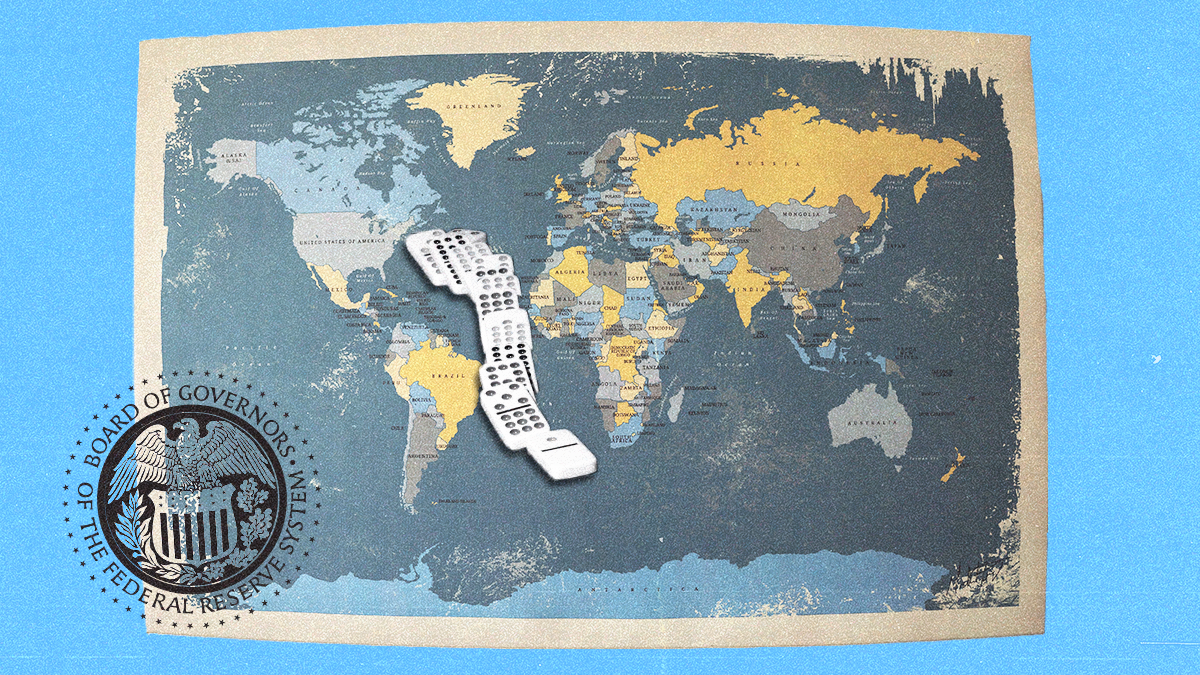August 01, 2022
Since the US Federal Reserve dramatically raised interest rates by 0.75 percentage points last week – its fourth hike this year – most analysts have focused on the domestic consequences of the policy: US homebuyers and business owners now face steeper loan repayments – as well as higher rates for new loans – which the Fed expects will dampen surging demand and cool the inflationary economy.
But what about the indirect consequences of the Fed’s move? The impacts of US monetary policy at home are already being felt by emerging market economies. What’s going on and where might this all be headed?
A borrowing bender. Many low-and middle-income economies were already highly indebted before the pandemic, including those involved in China’s ambitious Belt and Road Initiative, which conditioned infrastructure investment on shady loans.
That burden increased in 2020 as many poor countries – missing tourism and remittance dollars, and grappling with dwindling output – upped their borrowing to weather the pandemic, adding a whopping $19.5 trillion to global debt.
Consider some statistics: By October 2020, debt as a percentage of GDP had soared to 214% in Malaysia, 120% in Argentina and 110% in Pakistan. (To be sure, many wealthy countries are also facing very large debt burdens, though they have greater access to financial markets and more tools at their disposal to manage the fallout.)
High indebtedness has left emerging markets more vulnerable to tightening global financial conditions. For the many low and middle income states that still borrow in US dollars, servicing their debts became all the more costly recently when the US Federal Reserve tightened its belt to try and rein in 40-year high inflation. This raises the specter of a new wave of emerging market defaults like the ones that rocked the Global South in the 1980s and 1990s.
What’s more, now that higher interest rates have made US bonds more attractive, many global investors might opt to pull their capital from riskier emerging economies and instead stash their money back in the US. This would weaken emerging market currencies relative to the dollar and put upward pressure on inflation in countries that are already experiencing severe cost-of-living crises. As external financing dries up, many countries would be forced to sharply reduce their consumption and investment, triggering potentially devastating recessions.
This is a particularly big problem for import-reliant countries like Egypt, the most populous country in the Arab world. Grappling with sky-high food prices as a result of the war in Ukraine, Egypt is also bogged down by a debt-to-GDP ratio that now exceeds a whopping 90%. Disruptions to food supplies can be a game changer in Egypt, where roughly two-thirds of the population consume subsidized bread.
The past is prologue … or is it?
Could emerging market economies have done more to insulate themselves from the sort of economic shocks we’re now seeing?
It’s debatable, says Sebastian Strauss, a senior global macro analyst at Eurasia Group. Strauss notes that many low- and middle-income states “have been doing a lot of the right things in recent decades, like accumulating foreign exchange reserves, running smaller current account deficits, reducing their reliance on dollar-denominated debt, and diversifying their trading partners”– steps that, taken together, help build economic resilience. Some emerging market central banks like Mexico’s even started raising interest rates last year in anticipation of the Fed’s tightening cycle to prevent significant currency depreciation, inflation, and capital outflows.
Having learned the lessons from the Asian financial crisis of the 1990s, many Asian states in particular have undertaken significant reforms to build economic buffers, including increasing their foreign currency reserves, which central banks can use to bolster their national currencies. Consider that in 1997, Thailand’s foreign reserves were about 19% of its GDP; now they are around 52%.
Of course, many countries could have done more. Still, Strauss notes that “no one could have predicted the double whammy of exogenous shocks” – the pandemic and the Russia-Ukraine war – that have fueled the global credit crunch we’re now seeing.
Who is most vulnerable? Developing countries face a range of challenges, but some are at greater risk than others of joining the ranks of Sri Lanka as a recently collapsed economy. Those that run persistent current account deficits (i.e., spend more than they earn) and finance the shortfall with dollar-denominated borrowing are particularly vulnerable.
Bangladesh, with its foreign reserves having dried up, is in dire economic straits, as is the West African country of Ghana, where high levels of government debt – exacerbated by the global energy crunch – prompted the government to recently appeal to the International Monetary Fund for a bailout. Meanwhile, many analysts say that Pakistan, which relies almost entirely on food and fuel imports and whose currency has lost 30% of its value against the greenback this year, could be next to default on its foreign debt.
Looking ahead. Social unrest is never far behind economic instability. Governments across Latin America, Asia, and Africa are surely on edge … and will be for some time.
More For You
Tune in on Saturday, February 14th at 12pm ET/6pm CET for the live premiere of our Global Stage from the 2026 Munich Security Conference, where our panel of experts takes aim at the latest global security challenges.
Most Popular
- YouTube
In this Quick Take, Ian Bremmer weighs in on the politicization of the Olympics after comments by Team USA freestyle skier Hunter Hess sparked backlash about patriotism and national representation.
British Prime Minister Keir Starmer delivers a speech at Horntye Park Sports Complex in St Leonards, Britain, February 05, 2026.
Peter Nicholls/Pool via REUTERS
In July 2024, Keir Starmer won the United Kingdom’s election in a landslide. It has been downhill ever since, with Starmer’s premiership sullied by economic stagnation, intraparty fighting, and a lack of vision for the country.
© 2025 GZERO Media. All Rights Reserved | A Eurasia Group media company.
